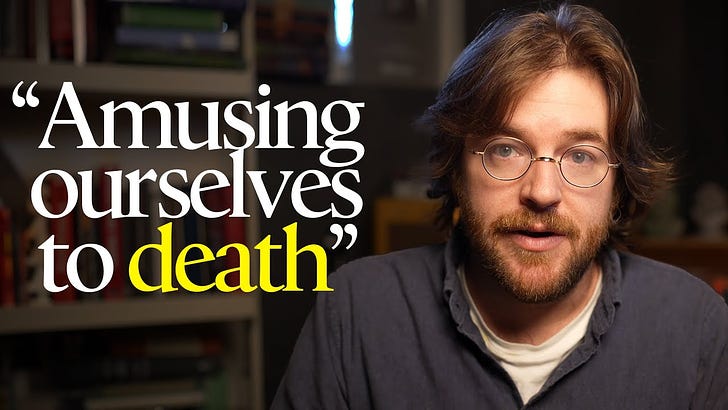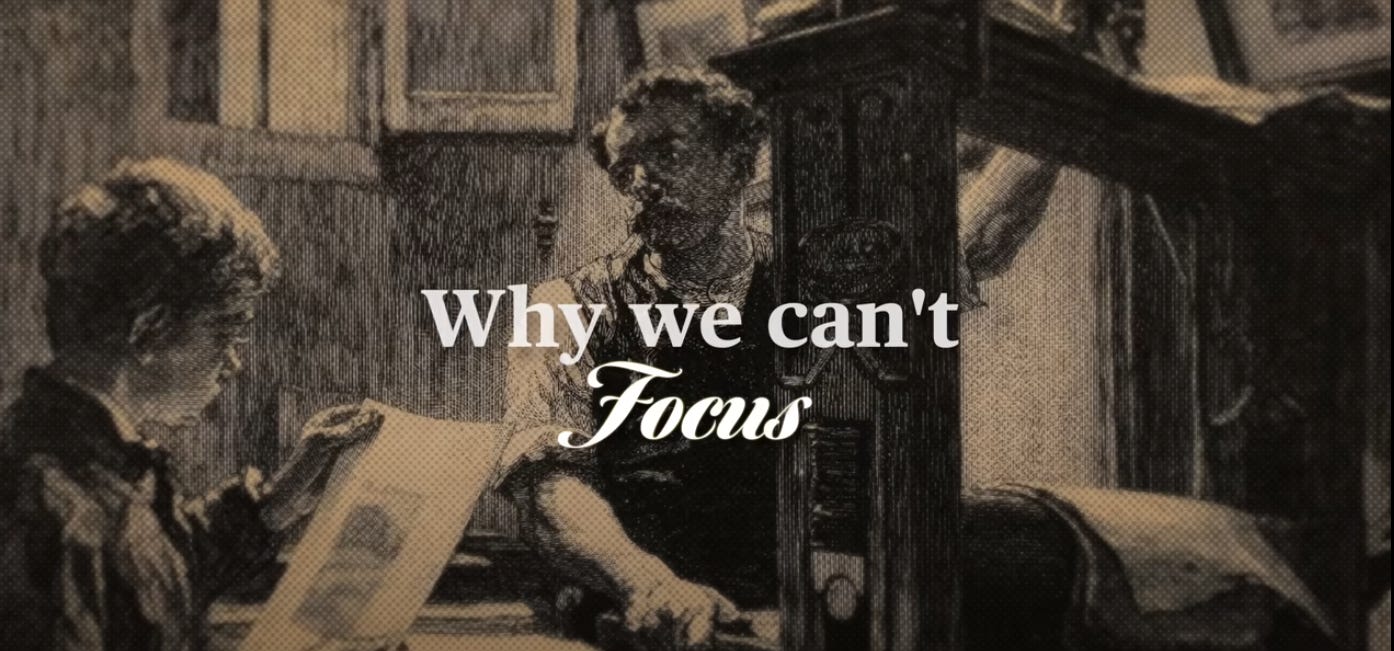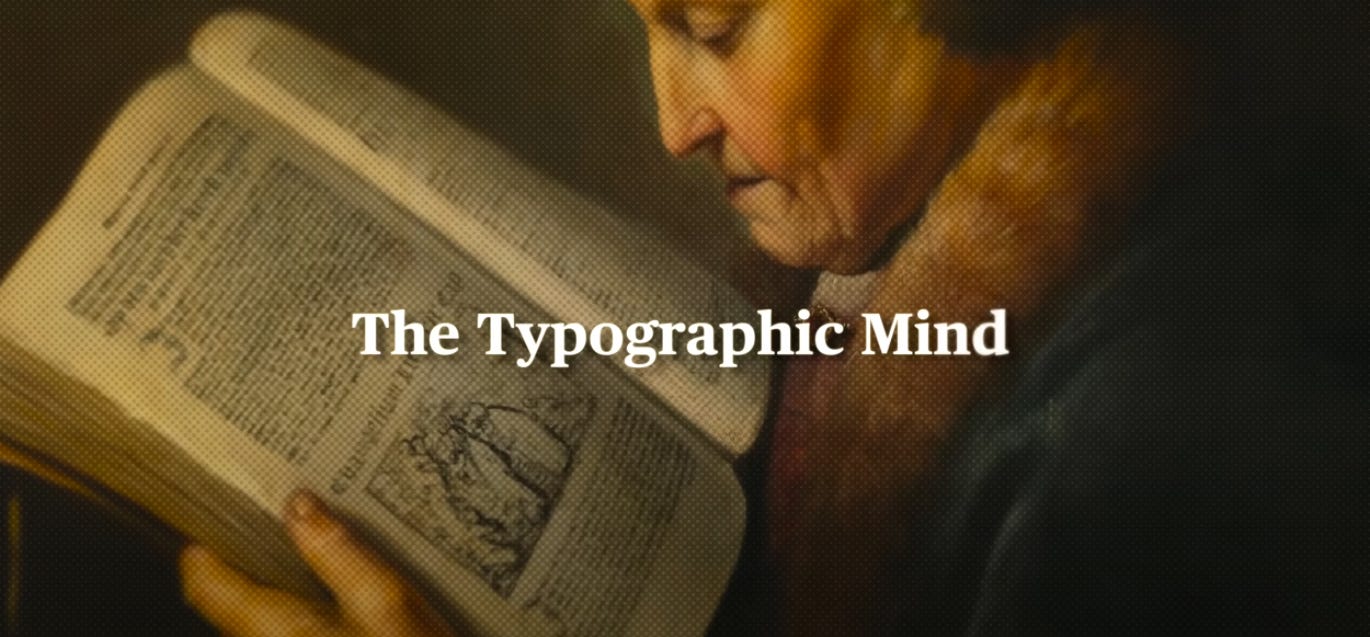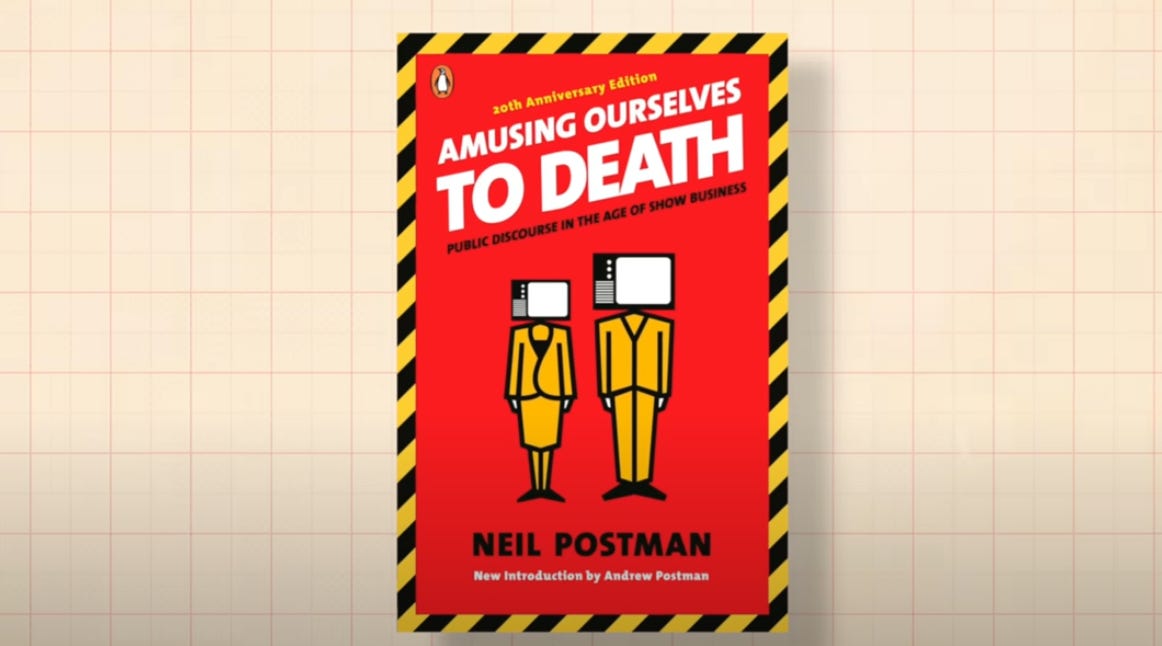Why We Can’t Focus – Jared Henderson - 12 Minute Video
Etienne recommended – Includes tips for improving focus
We are amusing ourselves to death. Video, TV, movies, music, podcasts, and on top of that, constant notifications. They're all flooding in. We are always being stimulated, and as a result, it is killing our ability to focus.
And this isn't just something that we've noticed about ourselves. Research backs this up. Attention spans are declining. It's easy to blame the internet for this problem, but it's actually much older than that, though the internet's made it worse.
And if we want to do something about it, we need to be able to break down the problem and really talk about where it comes from.
So that's what we're going to do today.I'm breaking this problem down into three parts, and it all begins with a shift from books to television.
In the 1980s, Neil Postman wrote the book Amusing Ourselves to Death. He was primarily interested in the cultural effects of a shift from using the written word as our primary way to transfer information to a shift towards mass media, and in particular, television.
The invention of the printing press changed the world. Suddenly, mass communication was possible on a scale that had previously always been impossible. And this is how new and radical ideas were able to so quickly spread. The Protestant Reformation probably wouldn't have happened without the printing press, or the Enlightenment, or the American Revolution.
But media theorists like Postman, and here we should also mention the work of Marshall McLuhan, also tell us that how we communicate ideas, the media that we use, actually changes the way that we think. McLuhan's favorite phrase here was, the medium is the message.
So Postman uses early American culture as an example of what he calls the typographic mind. This is a mind that has been shaped primarily through consuming books. And that means that it's a mind that's used to prolonged sessions of engaged, serious, rational activity.
In other words, it's a mind that's used to focusing. So that's the first takeaway: reading as an activity actually helps build your focus and shifts the way that you think.
But we've stopped reading. In Postman's time, more people were watching television than reading, and those numbers have only gotten worse. When you add screens and the internet and phones and all of that—which we'll talk about later—well, that just exacerbates the problem.
Two famous examples from American political history actually illustrate this really well. The first one is the 1858 Lincoln-Douglas debates. These are famous pieces of American political rhetoric. You should read them if you're at all interested. Some sources say that up to 18,000 people attended these debates, and they were later printed.
That's how you can read them. And it's actually how Lincoln became famous in the first place. Each debate was three hours long, and it would actually begin with a 60-minute opening statement from one of the candidates. Then, there was a highly structured format with prolonged responses.
This meant that the audience had to be able to stay focused for three hours and also needed to be able to follow a single complex thought for up to an hour or sometimes 90 minutes at a time. Postman says that they were able to do this because this audience, which would have mostly been literate people, was used to following long trains of thought from reading books.
If you skip forward to 1960 and the Kennedy-Nixon debates, you see something really different. These were the first political debates that were broadcast on television. Instead of an hour for an opening statement, the entire debate lasted only an hour, and the opening statement for each candidate was just eight minutes.
This meant that the audience watching at home didn't have to worry about following one thought for up to an hour or 90 minutes. Instead, they got small, condensed chunks of information that were easier to consume. This mirrored the general media consumption habits people had developed from watching television.
The whole debate was just an hour—it was literally one slot of primetime television. And you know what the big takeaway of that debate was? That Nixon looked bad on TV. That's why people say he lost.
Kennedy looked better on TV. Nixon's mom even called him to ask if he were sick. Generally, he just didn’t perform well in front of the camera, and he lost the election. Political history—or probably world history—was shaped because of television.
Already, the media we were consuming was changing the way we engaged in politics. That’s a big, consequential change when you consider how much power an American president has. Television was making us accustomed to consuming smaller, bite-sized pieces of information. It also made us more concerned with things like the appearance of a presidential candidate rather than the substance of what he was saying.
I imagine that if they had tried to have a three-hour debate on primetime television, ratings would have slowly declined. People just weren’t used to focusing for three hours anymore. The media we were consuming was changing our ability to think, and it was causing our ability to focus to atrophy.
Focus is a skill that you have to develop, and if we’re watching television all the time, we aren’t training ourselves to be deep and reflective thinkers—certainly not in the way that we would if we were reading good books. So, when it comes time to focus on something, like trying to read a really good book, well, you can’t do it. You never learned how.
People often tell me that reading books nowadays is inefficient, and that there are just better ways to get information. And I’m going to use some slang here that I think I’m too old to use sincerely, but this is pure cope.
Getting your information from summaries or even from YouTube videos like the ones I make is a completely different experience than learning from a book. In a book, you actually get to follow an author's chain of thought. As you read an author's thoughts, you are actively thinking with them. You're training yourself to think, and as you train yourself to think, you're also training yourself to focus.
Reading is like a mental workout, and you're not getting that elsewhere. So you're probably screaming at your screen right now, thinking that TV isn’t the most important form of media we encounter nowadays. And you're right. A cable news show gets fewer nighttime viewers than a really good YouTube video these days.
Maybe the fact that we can't focus is due to the internet, the constant barrage of notifications, and this overwhelming swarm of content that we’re immersed in. In other words, you might think it’s this that’s to blame—and I think that’s correct. Just like we shifted from books to television, we’ve now moved from television to the internet. And that represents a completely different way of thinking about information.
Neil Postman couldn’t write about the internet because he was writing in the 1980s, but another writer has come along to expand on these ideas: Nicholas Carr, who wrote The Shallows.
If you had to use one word to describe your experience of the internet, I have a feeling it would be something like chaos. The whole point of a page on the web is actually just to keep you looking at it.
So If you look at your YouTube home screen, you're going to see rows and rows of videos. Then you might see notifications, if you have those turned on. You’ll also see a search bar that invites you to find anything you want. If you search for a video, you’ll quickly be given recommendations. Click on one video, and you're immediately shown 12 more suggestions.
The whole point of that design is to ensure that if you ever get bored for even a second, there’s always something else to click on to keep you engaged. We're so used to this experience that it feels normal, but it’s actually chaotic. And YouTube isn’t even the worst offender.
Take TikTok, for example. I don’t really use TikTok, but the few times I’ve opened the app, I felt like I got a headache almost immediately. (And yes, I know I sound old in this video.) The idea on platforms like these is to always give you something to click on next—always.
Even if you’re watching a really good 10-minute video and you want to finish it, if you get bored for even a second, there’s always something more exciting just a click away. These platforms don’t actually care if you finish a specific video or article. They just want you to stay on their platform.
TikTok wants you on TikTok. YouTube wants you on YouTube. The New York Times wants you to stay on its site. That’s how the internet works.
This medium teaches you that information is easy and disposable. If you're even a little bit bored, you can move on. In fact, these platforms implicitly encourage you to move on. That’s the message they send.
In Nicholas Carr’s book, he stresses the plasticity of our brains—that is, our ability to change how our brains are structured in response to our environments. Our brains adapt based on what we do, what we need to do, and the tools we use.
Now, look at the chart for the average screen time for Americans. Ask yourself: what do you think that’s doing to our brains? One clear effect is that it’s ruining our ability to focus.
The bad news is that your brain is plastic. So, the fact that you use your phone constantly or watch too many YouTube videos means you are gradually losing your ability to focus. But the good news is that your brain is plastic. This means you can fix it.
If you made an effort to read more books, watch less YouTube, or even throw your phone into the fires of Mount Doom so it could never bother you again, you could actually save your ability to focus. This is a solvable problem.
But you have to remember: there’s a war going on for your attention, and it is not a fair fight. Large corporations, armed with PhDs in psychology and some of the best design engineers in the world, are working tirelessly to keep you engaged.
That’s why I like to say the internet is a hostile design environment.
Here’s a quote from the first president of Facebook, Sean Parker:
The thought process that went into building these applications, Facebook being the first of them, was all about how do we consume as much of your time and conscious attention as possible. And that means we need to sort of give a little dopamine hit every once in a while because someone liked or commented on a photo or a post or whatever.
That’s a very telling admission from someone who would know. If you listen to others talk about designing digital experiences, the underlying goal is always the same: capturing and holding your attention.
By comparison, something like a book isn’t as good at holding your attention—unless you’re already used to giving your attention to it. Books require your attention, but phones, screens, and internet videos steal your attention.
That’s why I call the internet a hostile design environment. It’s an environment intentionally designed to steal your attention, robbing you of your ability to focus. Why? Because people make money from it.
I mean, look, I even have to admit this: if I can keep you watching until the end of this video, I make more money. And the people who design these platforms? They’re not thinking about what this does to you in the long term.
Consider this: Steve Jobs once told The New York Times that he wouldn’t let his kids use an iPad. Similarly, Mark Zuckerberg and his wife don’t let their kids use Facebook. I’m not even sure if they let their kids have phones.
Basically, these are people who truly understand the effects of these technologies. They helped design, build, and popularize them, and they know exactly what they do to people. That’s why they wanted to protect their kids from these effects.
So, I would ask: why don’t you want to protect yourself from that?
There are steps you can take to rebuild your focus, but they’re all easier said than done. First, you have to turn off your phone. You need to learn to take long breaks from it. If you can go an entire day without looking at your phone, then you’re already making significant progress.
But you have to get used to it. Having something in your pocket that can grab your attention with a single sound or buzz—or even if it’s on silent, the promise that turning it on might reveal something fun—will rob you of your ability to focus.
Next, you need to start consuming media that actually demands your full attention.
This could even include movies. It doesn’t always have to be books. But if you’re going to watch movies, avoid those new Netflix-style movies. These are often written and produced with the assumption that viewers will be scrolling on their phones while watching. They’re made for distracted audiences. It’s already changing the way we create art.
So, instead, watch actual good movies. Go to a movie theater where they’ll kick you out if you turn your phone on.
And the third way—probably the most important—is to get used to not being digitally stimulated all the time.
For example, go on morning walks and leave your phone at home. Just go and be present with your thoughts. Try to see how long you can sustain a single thought during that walk. Think through an idea, debate with yourself, or follow a mental thread. It can actually be more enjoyable than it sounds.
The point is to get used to not needing constant stimulation from a phone or screen. By doing this, you’re training your brain to rewire itself. You’re encouraging your mind to relearn how to focus.
With consistent effort, we can make progress and regain the ability to focus on the things that truly matter to us.
Go paid at the $5 a month level, and we will send you both the PDF and e-Pub versions of “Government” - The Biggest Scam in History… Exposed! and a coupon code for 10% off anything in the Government-Scam.com/Store.
Go paid at the $50 a year level, and we will send you a free paperback edition of Etienne’s book “Government” - The Biggest Scam in History… Exposed! OR a 64GB Liberator flash drive if you live in the US. If you are international, we will give you a $10 credit towards shipping if you agree to pay the remainder.
Support us at the $250 Founding Member Level and get a signed high-resolution hardcover of “Government” + Liberator flash drive + Larken Rose’s The Most Dangerous Superstition + Art of Liberty Foundation Stickers delivered anywhere in the world. Our only option for signed copies besides catching Etienne @ an event.













Yes, humans have an inbuilt survival mechanism, except when it comes to pleasure……The psychologists of big tech know this secret.
It’s a kinda “candy crush” scenerio.